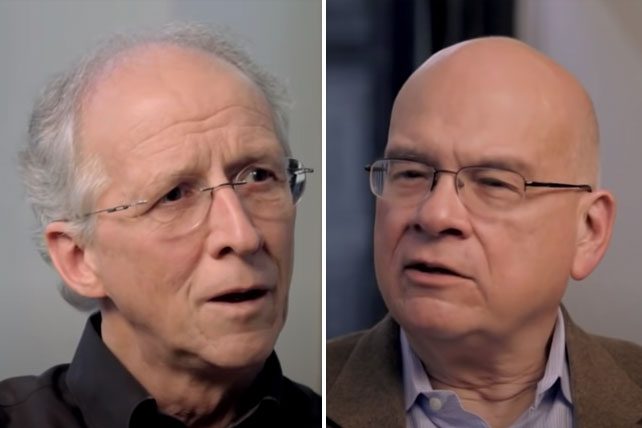I am a huge fan of The Amazing Race. My wife and I have talked about applying for many years, but we’ve never actually tried signing up (yet). It’s such a great idea for a game, filled with physical challenges, mental puzzles, and teamwork. But what does it look like to put on your own Amazing Race for your church or youth group?
We recently did a church-wide photo scavenger hunt, and our families had a great time. It got them out of the house to participate in something together, but they were able to still remain socially distant (Covid-19 times still). So we knew we needed to do something like that again, but what? Then we thought about The Amazing Race! Could we actually pull that off? Yes!
This can be done a number of ways, but here is how we did it:
Location: While the TV show takes people around the world, we decided to keep it all in the same town as our church. They also used their own vehicles to transport themselves (one per team). If you live in a city, you could consider using public transportation if you want to get closer to how they do it in the show.
Length: The show takes a few weeks, but we didn’t have that kind of time. While some would enjoy an all-day race, we decided on three hours. We had them show up at the church parking lot around 9:45 am, the race began at 10:00 am, and the race ended at 1:00 pm.
Audience: We wanted to make sure to include as many people as possible of all ages, so we had two races happen at the same time. The beginner race was for those with really young children. It had one less checkpoint, and the challenges were easier. The advanced race was for elementary-age kids through adults, had one more checkpoint, and more difficult challenges. (I do not recommend this for everyone, but we did it this first time.) We also had a minimum of three and maximum team size of how many will fit in your team’s vehicle. Some of our teams were families, and some were friends, neighbors, coworkers, etc.
Checkpoints: You will need enough checkpoints for teams to actually fill the time, but you don’t want to give them too many, or no one will finish in time. We decided to have everyone begin at the church with some “spot-it” type puzzles. Once their team finished that puzzle, they received a clue to take them to their first checkpoint. They then journeyed to each checkpoint around town before ending at the finish line in the church parking lot.
Clues: As stated above, in order to get to each checkpoint, the teams needed to first solve a clue. Some of the clues had them deciphering a code to get an address. We had a couple with latitude and longitude coordinates. Some were riddles. And others were identifying the location from a set of photos. Some did not have any problems, while others struggled with things like deciphering. If you want, you can allow teams to ask for hints via text, like we did. How much you help them, though, is up to you. Remember you want everyone to be challenged, but you also want them to keep having fun. Each clue was also printed off and placed in an envelope with our Amazing Race logo on it (to make it look official).
Challenges: The challenges at each checkpoint varied. Some involved eating, others involved a physical challenge, and others involved solving a mental puzzle. Once they solved one challenge, they received an envelope, which contained a puzzle or riddle that led them to their next checkpoint. We purposely spaced out our checkpoints around town, often having the teams double-back, which helped us fill the time. Some of the locations were at church members’ houses, some were at local businesses, and others were in public parks. I recommend personalizing this for your community as much as possible. Here are a few of our challenges: make five free-throws at a park, thaw and put on a frozen t-shirt at the church, drink a cup of salsa at a local Mexican restaurant, and make five paper airplanes that flew 5 yards each at the airport.
Volunteers: An event like this requires a lot of people! Do not even try to do this alone. You’ll need a team around you to help with all the prep work beforehand but also a host of people to help the day of the event. Not only did we have volunteers help with setup and cleanup, but we had a few people at each checkpoint. And because we ran two races at the same time, that meant we needed double the volunteers. Each of those volunteers required strict information about what to do at their checkpoint. Again, this event has a lot of moving pieces, so make sure to over-prepare and over-communicate with your team.
The Race: Due to our self-imposed time restraints, instead of sending everyone off to the first checkpoint, we decided to split them up so that each checkpoint did not start with more than four teams. This also meant we did not have to have enough resources for all the teams at each checkpoint. To win, all teams needed to complete all the checkpoints, but they did not all start in the same location. For example, as one team finished their initial set of puzzles at the church, their first clue sent them to checkpoint one. Another team, however, received a clue sending them to checkpoint five. While the first team will end up going from one to ten, the second team will go from five to ten and then one to four.
Finish Line: Once a team completed their final checkpoint, they received their clue, which led them back to the finish line at the church. Because each team had a different starting and ending checkpoint, we could not simply have the final clue at our final checkpoint. So our volunteers were instructed to which envelope to hand to which team. Going by the example above, the first team would receive their final clue after completing checkpoint 10, while the second team would receive it after completing checkpoint four. To help them with this, we gave a list of all teams to checkpoint volunteers and also added the team names to the final clue envelopes, so they made sure to get the correct one. In the future, we might help that even more by putting team names on all the envelopes. If you don’t split up the teams like we did, you can simply give the final clue at the last checkpoint and avoid this potential confusion.
Prizes: You can do prizes however you want. We decided to give a prize to the first place winners from each race. We also wanted to award other teams who were not as fast, so we gave prizes to the best team name, best team spirit, and the best singing/dancing team (one of the checkpoints required them to sing a song from memory). Since we did this race during COVID-19, we had our opening and closing ceremonies in the church parking lot, and we asked only the winning teams to come up and claim their prizes when they were announced, in order to keep everyone socially distant.
Other things to keep in mind: While the above list covers all of the basics of putting on an Amazing Race event, I also wanted to include a few additional ideas that should help you along the way. Some of these are tips, others are administrative ideas, and some are just further information on how we did our race:
- Be sure to practice the race at least once! Not only do you need to make sure each challenge is possible, you need to make sure they do not take too long to complete. You also need to make sure the entire race fills your time adequately. You don’t want everyone done too early, but you also want to make sure you have teams that actually complete the race in the allotted time. If you have a three-hour race like us, I recommend making sure the race is able to be completed in about two and a half hours. Not all teams will complete it, but you want to make sure it is possible. (About 20% of our teams completed the race this first time.)
- We chose to keep our race as simple as possible, so we did not include things like Speed Bumps, Detours, Road Blocks, Switchback, or any of the additional types of tasks or clues. They can certainly add to the fun, but they do make the race more complicated.
- It’s okay to have teams zig-zagging across town. Just remind them that they must do their checkpoints in order. Even if they pass another checkpoint on the way, they must not stop, or it will really mess things up. In order to help this, you might consider having numbered signs at each of the checkpoints, which will help teams know if they are at the right one.
- You will need a way to communicate with volunteers and teams. We used a mass texting service and had two groups (one to send messages to the volunteer team and one to send to the participating teams). This service also allowed people to text us, which helped when teams got really stuck and needed help.
- Start as early as possible when putting together your plan, gathering volunteers, and organizing the entire race. It will take more time than you think, as there are a lot more moving pieces than something like a scavenger hunt. We started planning around six weeks out. I would recommend starting at least that early. If you can do two months early, that would be even better.
- Be sure to leave yourself enough time to rework things, as you will most likely not get everything as it needs to be in your first draft.
- Be as clear as you can with your checkpoint volunteers exactly what they are required to do, especially if you end up spacing out the teams like we did (see above).
- Our race began at 10 am, so we had our main team show up early to get everything ready. But our checkpoint volunteers showed up at 9:15 to grab all of their things (materials for their checkpoint, tables, tents, water, etc.). And we had participating teams show up by 9:45 am.
- Our race ended at 1 pm, so we sent out a mass text message to all teams at 12:40 pm, telling them even if they hadn’t finished everything, they should complete their current checkpoint and then head back to the closing ceremonies at the church.
- While this is a fun event for a youth group, consider hosting it for your entire church. We had several teams of adults, who had a blast. We also had some teams of all different ages. This can easily become an event that goes beyond your youth group, and in my opinion, it should. (And when it does, you can probably get more people to help you!)
- Make sure to create your own logos for advertising. Please do not get yourself or your church in trouble for using the original The Amazing Race images without permission!
The Amazing Race is an awesome event that I really hope to do myself some day. In the meantime, though, I’ve really enjoyed putting together a miniature version for our church family. Participants have already told us how much fun they had playing along. I hope all of this helps you have a great event as well.
This article about how to do an amazing race originally appeared here.














